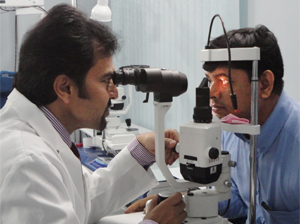
| Home | Int. Patients | Contact Us |
| Location Map |
| Online Appointment |
| Testimonial |
| Ask a Consultant |
| When Visit Us |

 Comprehensive Eye Exam
Comprehensive Eye ExamHaving a comprehensive eye exam each year is the best way to enjoy good vision throughout your life. Many eye diseases and vision problems have no obvious signs or symptoms. As a result, individuals are often unaware that problems exist and thus millions of people suffer from poor vision. Early diagnosis and treatment of eye and vision problems are important for maintaining good vision and eye health, and when possible, preventing vision loss. The doctors and the staff members at Dhaka Eye Care Hospital are pleased to provide a full range of comprehensive eye care services including routine eye examinations using the latest equipments for your eye health and vision. All the patients visiting Dhaka Eye Care Hospital goes through the following routine eye examinations:- |
|
Vision testing - Vision testing involves making a person read standard sized letters at a specified distance. Near vision is tested separately in good illumination using special test charts held at normal reading distance. The testing is done with each eye separately. Refraction - This test uses an instrument referred to as a phoropter. Your eye doctor will use this instrument to test various lenses against your eyes, enabling the eye doctor to determine the best power prescription for your eyeglasses or contacts. The phoropter measure the exact level of astigmatism, myopia or hyperopia you may have. Tonometry - This test is important to determine the intraocular pressure (IOP) or eye pressure in the evaluation for glaucoma. At Dhaka Eye Care Hospital a non-contact Tonometry is typically performed which you may feel as a puff of air test. Cover Test - During this test, your eye doctor will cover one eye at a time to detect any ocular deviation such as strabismus also known as an eye turn or lazy eye. Essentially, it measures how well your eye works together and helps detects problems including poor depth perception. Pupil inspection - The patient's pupils will be inspected for equal size and regular shape. Then the doctor tests how they react to light and objects at various distances. Slit Lamp - During this test the doctor uses a special high power microscope to examine the structures of your eye, testing for infections or ocular diseases. This test is beneficial for detecting conjunctivitis and other common eye diseases as well as more serious ocular conditions such as cataracts and macular degeneration. Dilated Fundus Exam - In this test an eye drop is placed in the eyes in order to dilate the pupil. With the pupils dilated, it creates a larger window for your doctor to look inside the eyes. The doctor will test eyes for various eye diseases which is important to detect the health of the internal structures of the eye. The doctor evaluates the examination data and if further eye screening is needed to determine the various eye conditions such as glaucoma, macular degeneration etc then will proceed to other examination such as:- Visual Field Screening - This test is usually performed by the eye care assistant, also known as a technician, with the assistance of a machine to analyze your visual field. The machine then prints out a detailed reading of areas of the vision that were or were not seen. Retinal examination - A retinal examination also known as ophthalmoscopy or fundoscopy, examines the back of your eye, including your retina, optic disk and the underlying layer of blood vessels that nourish the retina (choroid). Finally, if eye disease is detected during examination the Ophthalmologist will determine and prescribe the best treatment options-glasses, contact lenses (or both), laser surgery or other ocular treatments and surgeries based on your exam results. For eye exam book an appointment or Call us at 88-02-7914409, 88-02-7913975 today. Back to Top |
| Follow us on | Join us on | Watch us on |
 |
 |
||







Bitnet Solutions

All Rights Reserved.